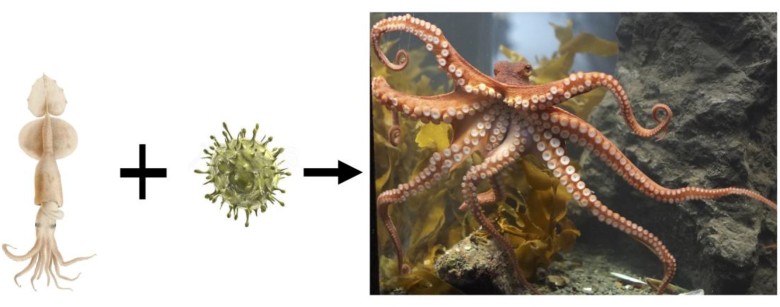No, the octopuses did not fly from space

The evolution from squid to octopus is compatible with a set of genes introduced by extraterrestrial viruses, according to the authors of the scientific work. According to them, the scenario is that a population of cryopreserved octopus embryos flew in from space 275 million years ago.
An unusually stormy discussion in scientific circles was caused by an article published on March 13, 2018 in the journal Progress in Biophysics and Molecular Biology (doi: 10.1016 / j.pbiomolbio.2018.03.004).
A group of authors (33 authors from 23 scientific institutions) offers an unusual explanation of the Cambrian explosion - a sharp increase in the number of living beings on Earth, which happened about 540 million years ago. This period includes the appearance in the fossil record of the remains of chordates, arthropods, mollusks, echinoderms, and other animal species. That is, at one moment, the biodiversity on the planet has greatly increased with a general cardinal increase in the number of animals.
')
So, the authors of the article are promoting the idea that the Cambrian explosion may be of extraterrestrial origin ! This is the reincarnation of the old panspermia hypothesis, which was put forward in the 1970s by one of the authors of the new article. However, he is not the first: the idea is described in the novel “The Andromeda strain” by Michael Crichton and other science fiction works.
The panspermia hypothesis suggests that it is possible to transfer living organisms with natural objects such as meteoroids, asteroids or comets, as well as with spacecraft. The consequence of this hypothesis is the assumption of the origin of life on Earth as a result of bringing it from outer space.
An indirect confirmation of this theory is the existence on earth of extremophiles - microscopic life forms that can survive in the conditions of space. Such animals may be in an inactive form for a long time, until they reach another planet or mix with the substance of protoplanetary disks.
There is also a hypothesis of "soft panspermia", according to which organic molecules flew from space, on the basis of which the birth of life occurred on Earth during abiogenesis. It has now been established that there are conditions for the synthesis of organic compounds in the clouds of interstellar gas and dust. Moreover, the simplest organic matter was found on comets and other space bodies (see “Glycine was found in space” ).
Apologists for panspermia believe that life could not only originate from an extraterrestrial source, but in the process of evolution it could be enriched from it. For example, the same fantastically tenacious tillers could well fly to Earth with some comet or asteroid.
The authors of a new scientific work put forward the idea that such enrichment was the cause of the Cambrian explosion. For example, fertilized eggs of animals from other worlds could fly to Earth.
Take a look at the octopus

Unfortunately, the authors of the article do not provide any actual evidence. But the idea suggests itself, if you just ... look at the octopus !
According to the authors, the complex nervous system, “camera-like” eyes and the ability to hide octopuses “suddenly and without precedents” developed in their genealogical tree. It does not appear that the genes for these adaptations are derived from the ancestors of octopuses, but "then it is plausible to assume that [these traits] are borrowed from the distant" future "from the point of view of earth evolution or more realistically from outer space as a whole."
The article presents one of the theories that the fertilized eggs of octopuses flew to Earth with an ice comet at the beginning of the Cambrian explosion. Another explanation, in their opinion, is that an extraterrestrial virus has infected a population of early squids, forcing them to quickly evolve into octopuses, as we know them today.
Other researchers do not support this theory: "There is no doubt that early biology is fascinating - but I think it is counterproductive, to say the least," commented Ken Stedman, a virologist and professor of biology at Portland State University, to Live Science. “Many of the statements in this article go beyond speculative assumptions and are not even based on literature.”
For example, according to Stedman, the octopus genome was decoded in 2015 . Although there were indeed many surprises in it, one of the important conclusions was that the octopus' nervous system genes separated from squid only about 135 million years ago - long after the Cambrian explosion.
Stedman added that for a RNA-based retrovirus to somehow turn a squid into an octopus, it must evolve in a world where there are already many squid. Modern retroviruses evolve for a long time for a specific purpose, and a retrovirus from outer space cannot be so aimed specifically at squid, unless it has arrived from a planet where many squid also inhabit. “But I think that such an assumption is unlikely,” said Stedman.
Other experts agree with this opinion. Some believe that the article is useful as a fresh look at the reflections on the role of the Universe in the evolution of life on earth, but it cannot be taken seriously.
Source: https://habr.com/ru/post/374523/
All Articles